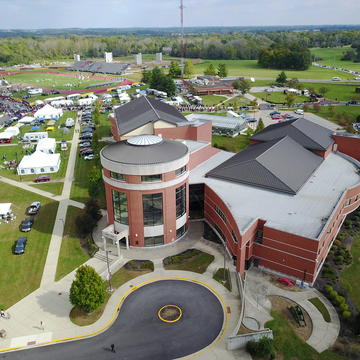Central State to supervise the growing of African heritage crops on farms across Ohio
Pictured is Central State University. Photo courtesy of CSU’s website.
Samantha Neveril | Contributing Writer
Ohio African Heritage Crops: CSU Extension receives a $49,999 Sustainable Agriculture Research and Education (SARE) Partnership Grant to test African heritage crops across Ohio.
When Clare Thorn, extension associate of Agriculture and Natural Resources at Central State University, turned on the television one restless night, she had no idea how inspired she would become.
PBS was airing a documentary on Percy Lavon Julian, an African American chemist who was able to synthesize medicinal drugs for glaucoma, rheumatoid arthritis and birth control from plants. Since CSU is a historically Black university, the documentary inspired Thorn to research other African Americans who have influenced modern agriculture.
“Watching that documentary inspired me to dig deeper into a lot of other inventors, scientists, botanists that kind of have been like pushed under the rug or their information wasn’t well known, at least in my case,” Thorn said in an interview on March 1.
She felt compelled to use what she had learned to try and boost her students’ interest in the Seed to Bloom Botanical Garden on CSU’s campus, so she created a designated Black heritage area filled solely with African crops.
Shortly after conducting research on which African crops might grow best, Thorn heard about the Sustainable Agriculture Research and Education (SARE) Partnership Grant.
The SARE program was created in 1988 to implement sustainable agriculture practices across the U.S. through grants and education opportunities. Its mission is “to advance – to the whole of American agriculture – innovations that improve profitability, stewardship and quality of life by investing in groundbreaking research and education.”
SARE awards partnership grants to programs that build strong relationships between agriculture professionals and small-time farmers that advance on-farm research and education activities.
With that said, Thorn decided to apply for a grant to expand the project. She enlisted the help of Nellie Rowland, the Agricultural Natural Resource educator for the southern region of CSU Extension, to help write the grant.
The two were able to obtain $49,999 in SARE grant money to test the viability of African crops at farms in Columbus and Cincinnati. The trials will be conducted by four African American urban farmers. The program focuses on urban areas because CSU is an 1890 land-grant institution. This means the university primarily works to strengthen food and agricultural sciences among urban areas, minorities and underserved populations.
The two-year program will launch on April 1 and continue until March 2026.
Each farm site will grow between two and 10 crops per farm to see how compatible the crops are with Ohio’s climate and soil. Some of these crops include heritage greens, okra, southern peas, waterleaf, eggplant, basil, peppers and more.
According to an interview with Rowland on March 1, farmers will send in monthly reports to test if the crops can properly grow in Ohio. The data will focus on germination, viability and the yield of crops produced.
Many people are excited for the program to begin because, if it is successful, it will allow more individuals to access these crops. Finding and purchasing these crops has not been easy since they were introduced to American agricultural farmlands during the slave trade.
This program is especially meaningful to the African American communities in Ohio because it connects them to their heritage. According to Rowland, many people who live in the areas where the trials will be conducted are of African descent, and they became excited about the possibility of easy access to the foods they grew up eating.
“We all have this type of memory of the food we loved when we grew up, and so it’s having the accessibility to fresh produce, not shipped over, I think is what really kind of sparked a lot of interest,” Rowland said.
This project will be a vital contribution to the preservation and promotion of African agricultural knowledge in Ohio. Once the farmers have produce to sell, they can educate people who are unaware of these crops on their significance in African cultures. In turn, other cultures can then enjoy these foods after they learn how to properly cook and eat them.
If this project is successful in Ohio, Thorn hopes to see future opportunities to expand the cultivation of African heritage crops across the nation.
“The environment is going to be the key factor,” Thorn said. “I mean, some of these crops may be getting grown more in the southern regions, for sure, but this could be a more northern climate thing if we can be successful with that.”
Regardless of the project’s success, this program represents a significant step toward fostering community connections and preserving African agricultural heritage in Ohio.
For more information on news all across Ohio check out more from Flyer News here!

